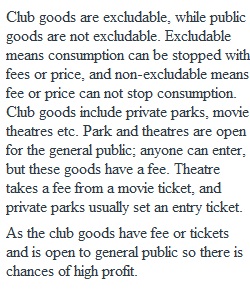


Q Club Goods and Natural Monopolies If Yosemite Park were private, what would be the price to enter? B.4.2.6 Advanced Explanation- Club Goods- Natural Monopoly C.3.2.4 Advanced Explanation- Natural Monopoly Club goods (also artificially scarce goods) or natural monopoly goods are a type of goodLinks to an external site. in economicsLinks to an external site., sometimes classified as a subtype of public goodsLinks to an external site. that are excludableLinks to an external site. but non-rivalrousLinks to an external site., at least until reaching a point where congestionLinks to an external site. occurs. A club good is a good that is virtually unlimited in terms of the quantity available but those who do not belong the club that provides the good can be excluded from using the good. In relation to other types of goods, it is excludable (people can be prevented from using it) but non-rivalrous (when one person uses the good it does not diminish the quantity available to other members). Often these goods exhibit high excludability, but at the same time low rivalry in consumption. Thus, club goods have essentially zero marginal costs and are generally provided by what is commonly known as natural monopolies. Furthermore, Club goods have artificial scarcityLinks to an external site.. Club theory is the area of economics that studies these goods. Club Goods are expansive and Non-Rival yet the public may be excluded from use (Excludable) Examples of club goods include, cinemas, cable television, access to copyrighted works, and the services provided by social or religious clubs to their members Digital downloads are an example is an example of a club good, consumers can be excluded from purchasing a digital download until they pay for it but when one consumer purchases a download, it does not decrease the amount available. Digital TV is another example, consumers pay a subscription fee giving them access to the club and they receive the TV shows which can be sent to an infinite amount of subscribers. Discussion Question: 1. How do Club Good differ from Public Goods? 2. How do Entrepreneurs profits from Club Goods? 3. Why do government need to regulate Club Goods? Discussion Question Requirements: Each student is required to post a 150 word response to the question. The student then must post at least a 50 word response to at lease ONE other student post. Post-=4 points. Comment = 2 Points Submit Original Post by the Due Date. Comments are open for four (4) days after the Due Date or until the Available Until Date How to Participate and Answer Discussion Questions
View Related Questions